A more sustainable way of living
Family meets its needs with available resources
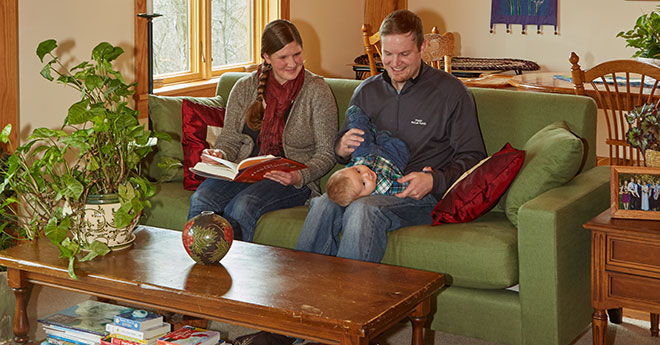
For Chris Meyer, his wife, Erin Gotwals, and their young son, Carsten, electricity comes from the sun. Water for drinking, cooking, bathing or washing clothes comes from the clouds that drift over the family home in Coshocton County, Ohio.
It might sound like the trio live in an old home. But Chris and Erin built their house in 2016-2017 next to a farm owned and operated by Chris’ parents, Ron and Mary Meyer. Much of the land was mined for coal years ago.
To say that the farmstead of Chris, Erin and Carsten is in a rural area is an understatement. The family’s mailing address is a town with a population of 140, according to the 2010 Census.
The choice to live sustainably was a conscious one.
“We’re adapting our lifestyle to the available resources, rather than the other way around,” said Chris.
Carsten, born in May 2017, wears cloth diapers rather than disposables for environmental reasons.
Unlike many parents, however, Chris and Erin are using their own rainwater and solar energy to wash the diapers. They don’t have a clothes dryer, so laundry hangs to dry.
Chris’ professional role
Chris is quite literally practicing what he preaches in his role as Manager of Stewardship Investing Research and Advocacy for Praxis Mutual Funds® and Everence® – a field he’s worked in for about 12 years.
Praxis, the mutual fund family of Everence, engages in stewardship investing – what some call socially responsible investing – combining social and financial considerations as it strives to make a positive impact on the world.
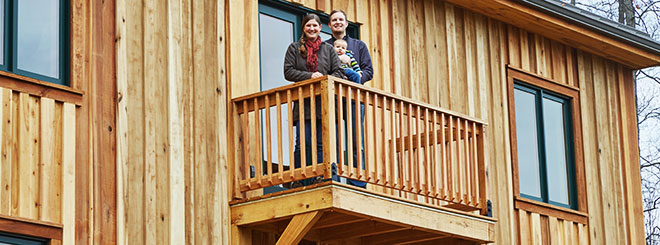
Chris is part of the climate change leadership team at the Interfaith Center on Corporate Responsibility (ICCR), the nation’s leading member-based coalition of institutional investors who try to use their investments as catalysts for social change. Everence has been an ICCR member for over two decades.
A good deal of Chris’ work involves corporate engagement – basically, “using finance as a lever to change the world.”
Owning shares of stock in a public corporation entitles investors to certain rights, including communicating with company managers and voting on issues involving the corporation’s future direction.
Investors also can file shareholder resolutions aimed at influencing what a company does and how it does it.
Shareholder advocacy
Shareholder advocacy means using these shareholder rights and privileges to promote corporate policy change. Praxis invests in companies on behalf of its clients, and practicing shareholder advocacy with those investments is an important part of Chris’ job.
Praxis challenges harmful corporate activities, encourages positive social change and supports business decisions that provide long-term benefits for all stakeholders.
The fund family’s shareholder advocacy efforts include working with electric utilities to mitigate climate change, and pressing major retailers to use safer chemicals in their personal care products. Praxis also has worked to reduce the use of conflict minerals in cellphones – metals mined in the Democratic Republic of Congo that fund and perpetuate violence.
Investments can support access to opportunity for disadvantaged individuals and communities through community development investing. Through its partnership with Calvert Impact Capital, Praxis channels nearly 1 percent of each fund to help foster loans to nonprofits, finance women-owned enterprises and provide access to alternative energy in low-income communities and in emerging markets.
The Ohio land
In 2007, property next to Chris’ family’s farm in Ohio went up for sale. Chris was living in Goshen, Indiana, and working in the Everence corporate headquarters building, but, “I had a decision to make, and determined that I’d eventually like to live there.”
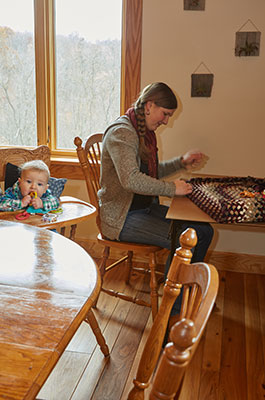
Chris had lived on his family’s farm until the age of 3, when his parents moved to Scottdale, Pennsylvania, to work for Mennonite Publishing House. And while Chris spent the remainder of his childhood in Scottdale, his grandmother still lived on the Ohio farm and Chris often would work there during the summers. Ron and Mary moved back to the farm after about 16 years in Scottdale.
After securing a loan from Everence Federal Credit Union, Chris bought the adjacent land in 2007.
In 2012, Chris and Erin began dating – and married two years later. They began their married life in Goshen, but Erin liked the idea of living on a farmstead.
A few years ago, Chris and Erin bought a landlocked parcel next to their property, which had been owned by Chris’ aunt and uncle. It’s on that property that the couple’s house now stands.
The house project
When Chris’ parents moved back to Ohio, Mary continued working as an editor for the publishing house while Ron focused on farming and construction.
Ron’s construction knowledge made him an obvious choice as construction manager for building his son and daughter-in-law’s house.
“He offered insight, and he shared our philosophy too,” Chris said. “He knew what we wanted. All of that was tremendously helpful.”
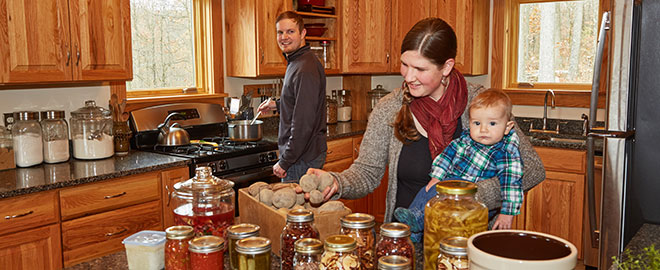
Construction started in April 2016, and Chris and Erin lived with Ron and Mary for a few months until the house was completed a year later. Ron handled much of the construction himself and supervised the subcontractors. Chris and Erin spent many evenings working on the house during that period.
What makes this house special?
• The electrical and rainwater systems harness the weather to provide power and water.
• Wood to build the house came from the property itself.
• It boasts an energy-efficient floorplan, complete with hot-water faucets near the water heater, excellent insulation, and energy-conscious appliances and lighting.
• Nontoxic materials were used whenever possible for environmental reasons and to enhance indoor air quality.
Thirty-two ground-mounted solar panels provide the home’s electricity. A cloudy day doesn’t mean the panels aren’t contributing anything. “The panels do still generate electricity when it’s cloudy,” Chris said.
Heavy fog and rain are the worst conditions, when very little light gets through to the panels. A battery system provides two to three days of power if no light is reaching the solar panels.
There’s also a gasoline-powered generator to charge the batteries, if necessary. “We’ve only had to use it a couple of times,” Chris noted.
The solar panels are mounted on the ground because the surfaces of the home’s roof face east and west, and the most solar energy usually is collected from panels that face south. Having the panels on the ground also makes it easier to clear off snow if it starts sticking to them.
Chris and Erin don’t have a TV, and their limited internet service is not used to stream any programming – it’s mainly for Chris’ work.
Rain is necessary too
Rainwater flows down the metal roof into gutters and downspouts, which lead to a 3,300-gallon, underground cistern. A pump inside the cistern pressurizes the water, and a pipe connects the cistern to the home’s plumbing.
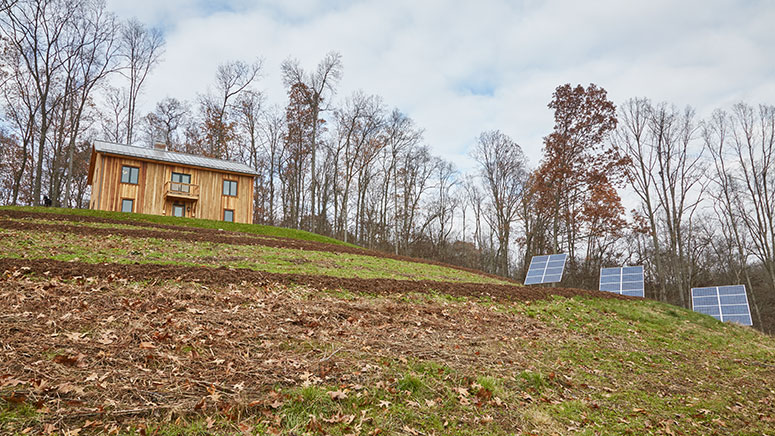
Several filters, including an ultraviolet filter to kill any potentially harmful bacteria, purify the water. The first filter in the series stops leaves or twigs from entering the cistern.
The water doesn’t need softening because rainwater contains few minerals.
Chris and Erin weren’t sure rain would provide enough water, but they calculated their anticipated needs and reviewed them with the subcontractor.
They conserved water and made it through a six-week dry spell last summer. “If there’s a prolonged drought, we might have to haul water in,” Chris said. They have a 400-gallon water tank that fits on a pickup truck if hauling becomes necessary.
In winter, snow usually doesn’t melt fast enough for the water to reach the cistern, “but we don’t have too many months in the winter without rain. And we can minimize how much water we use.”
Wood to build the house came from their own trees. Chris marked trees in their woods to be used for the project – trees that were dead or dying, or their removal would benefit the rest of the forest.
Trees were also cut down to make way for a lane leading to the house, and that wood was used too.
Chris said, “The wood in the house was my favorite part of the whole project. Its natural beauty, the work we put into it and the fact that it’s from our property make it special.”
The home’s heating source is a wood stove on the lower level. A ceiling fan in the living room circulates the air, keeping the warmest air from settling near the ceiling.
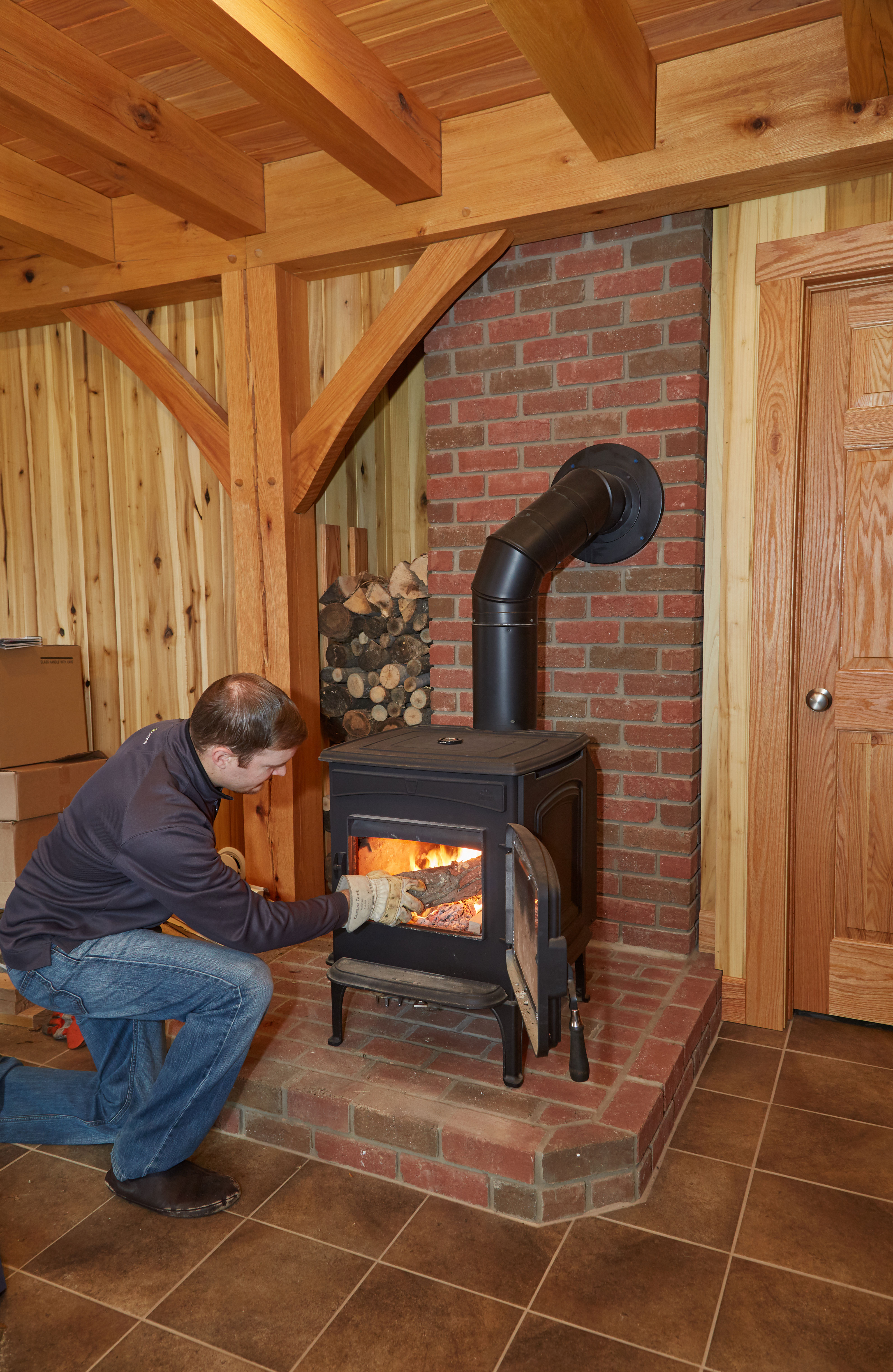
Chris and Erin also have a root cellar, where they store potatoes, carrots and other crops. “The kitchen and root cellar were designed to help us process and store a lot of our own food.”
Chris said, “We’re producing over half of the food we eat, from the farm and garden. We have chickens for eggs and meat and I hunt deer.”
A proactive approach
Sustainability for the Earth is what it’s all about.
Because they know they don’t have unlimited resources, Chris and Erin are careful about how they use what they have.
But, Chris said, “It’s more about prioritizing what’s meaningful and life-giving for us, rather than looking at it as a sacrifice. What’s best for the broader world often turns out to be what’s most fulfilling for us as well.”
He added, “It’s consistent with my work, too – the kind of change I encourage companies to make.”
Chris is aware that some people believe climate change is too far along to reverse, or that one household can’t make a meaningful difference.
As far as he’s concerned, however, “Being proactive is the antidote to losing yourself in hopelessness and cynicism.”
Living in their new house has been anything but boring.
“It’s been challenging at times, but really it’s been rewarding,” Chris said.
And even though building the house is behind them now, “our plans are not fully realized yet. We’re excited to plant an orchard and berry bushes, and further explore what it means to live out our values.”
